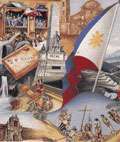Battle of Manila (1574)
| Siege of Manila | |||||||
|---|---|---|---|---|---|---|---|
| Part of the Spanish colonization of the Philippines | |||||||
| |||||||
| Belligerents | |||||||
|
| Chinese Pirates | ||||||
| Commanders and leaders | |||||||
|
| Limahong | ||||||
| Strength | |||||||
| 600 total Spanish forces (300 troops imported from Mexico and 300 Ilocano Warriors from Bauang plus some unknown amount of members of the village militia led by Don Galo. | 3,000 Chinese Pirates and Mercenaries (Mostly Japanese and Taiwanese) | ||||||
| Battles of Manila |
|---|
| See also |
|
| Around Manila |
|
The Battle of Manilla (1574) was a battle in the Manila area mainly in the location of what is now Parañaque between Chinese pirates, led by Limahong and the Spanish colonial forces and their native allies. The battle occurred on November 29, 1574[1] when Limahong's fleet landed in the town of Parañaque and from there, began to assault the fortifications of Intramuros. Initially, the inhabitants where disorganized and Limahong's forces routed them. Furthermore, the Chinese killed the Master-of-Camp of the Spanish, Martin De Goiti. This caused them to delay their assault on Manila as Martin de Goiti's house was an obstacle in their march.[2] However, upon the arrival of a certain Filipino hero called, Galo, resistance started to organize. Under Galo's command, they were able to resist China-born Limahong until Mexico-born Juan de Salcedo arrived from Ilocos with 300 Ilocano Warriors and Limahong was defeated and eventually forced to retreat. Thereafter Limahong abandoned his plans to invade Manila and instead, set up a temporary kingdom in Pangasinan.
Eventually the battle came to be known as "The Red Sea Incident" due to the blood spilled in defending the Barrio and Manila.
See also
References
- ↑ De Borja, Marciano R., Basques in the Philippines.
- ↑ Relation of the Filipinas Islands. Francisco de Sande; Manila, June 7, 1576.
- Stearn, Duncan, Chronology of South-East Asian History 1400-1996 (Dee Why, NSW: The Mitraphab Centre Pty Ltd., 1997).
- "La Relación del suceso de la venida del tirano chino del gobernador Guido de Lavezares (1575): Épica española en Asia en el siglo XVI:" Edición, transcripción y notas (incluye facsimil del manuscrito original), Juan Francisco Maura. Lemir (Departamento de Filología Hispánica de la Universidad de Valencia), 2004.
Coordinates: 14°35′N 120°58′E / 14.583°N 120.967°E
